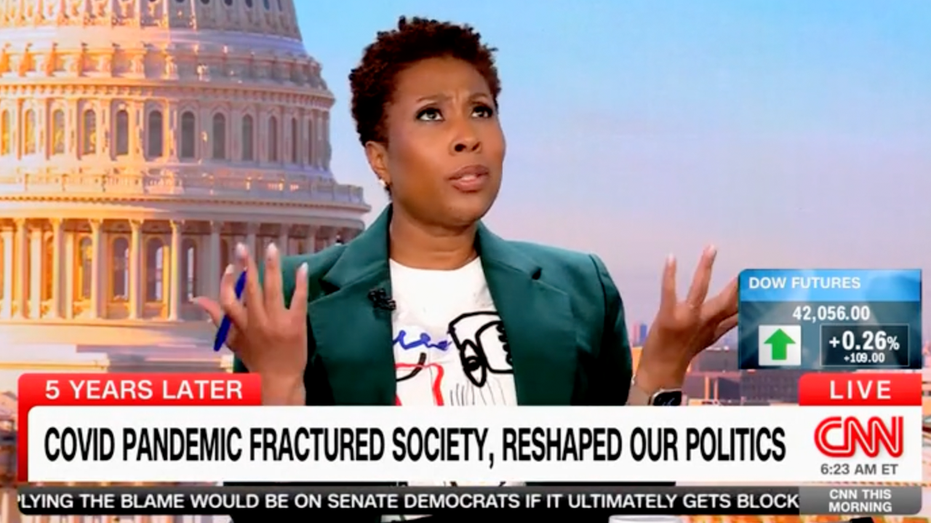CNN Host Reflects on How COVID-19 'Radicalized' Parents Across America

Sarah Johnson
March 11, 2025
Brief
CNN host Audie Cornish discusses how the COVID-19 pandemic 'radicalized' parents, impacting U.S. politics, public trust, and education, and fueling national divisions.
CNN host Audie Cornish remarked this week that the COVID-19 pandemic led to the "radicalization" of parents throughout the United States, sparking significant shifts in political and social dynamics.
On Tuesday’s episode of "CNN This Morning," Cornish discussed the topic alongside a panel of guests that included former Bernie Sanders campaign advisor Chuck Rocha, ex-Homeland Security official Ashley Davis, and The Boston Globe’s D.C. bureau chief Jackie Kucinich. The conversation revolved around the pandemic's enduring effects on American politics and culture.
"I also think about maybe the – I hesitate to use this word – but kind of radicalization of, say, parents, right?" Cornish posed, pointing out one of the noticeable societal shifts during the pandemic.
The discussion took place as the nation marked the fifth anniversary of the World Health Organization declaring COVID-19 a pandemic. Reflecting on the grim milestone, Cornish noted that the virus had claimed over 1.2 million lives in the U.S. and had profoundly fractured the country.
"Beyond the human toll, the pandemic also hopelessly fractured this nation in so many ways," Cornish observed. She cited a Pew survey showing that over 70% of adults believe COVID-19 "did more to drive the country apart than to bring it together."
Highlighting the role of misinformation, Cornish referenced a video of Health and Human Services Secretary Robert F. Kennedy Jr. from 2020, in which he speculated that much of the pandemic response felt "very planned." This, she suggested, sowed distrust in U.S. institutions and fueled societal divides.
Cornish also pointed out how the pandemic reshaped dynamics around schools, public health, and office culture. "The pandemic has changed so many dynamics here," she remarked, "not to mention our politics."
The panel discussion delved into how these changes affected individuals and communities. Cornish emphasized that the frustrations of parents, particularly over school closures and challenges at home, transformed them into an influential voting bloc. "People who were really upset about those school closures and were struggling at home, struggling to be heard. They became a voting bloc," she explained.
Panelist Chuck Rocha agreed, adding, "It exposed a lot of weakness in our society because we weren’t prepared for that. And now, you skip forward to today. What’s happening five years later is you have a measles outbreak in Texas because folks don’t trust vaccines due to misinformation spread online."
The broader social and political fallout from the pandemic has continued to evolve. Media outlets have criticized parents for seeking greater control over their children's education, often framing such efforts as politically motivated. For instance, a 2021 Washington Post opinion piece argued that parents "don’t" have a right to dictate their children’s education. Similarly, columnist Jonathan Capehart referred to parents as a "foil" in what he described as a "far-right" agenda targeting public education.
The tensions escalated further in 2021 when the Department of Justice under the Biden administration issued a memo directing the FBI to use counterterrorism tools to address parents protesting at school board meetings. Around the same time, the National Education Association urged social media companies to crack down on "propaganda" about critical race theory, citing concerns over what it described as a "small but violent group of radicalized parents."
Topics
Editor's Comments
The phrase 'radicalization of parents' hits hard, doesn’t it? It’s a bold way to frame what’s essentially a breakdown of trust in institutions. Cornish makes a valid point about how pandemic frustrations fueled political shifts, but the labeling of parents as 'radicalized' feels like a rhetorical grenade. Maybe it's time to consider whether this distrust was radicalization—or just parents deciding they’d had enough of being sidelined.
Like this article? Share it with your friends!
If you find this article interesting, feel free to share it with your friends!
Thank you for your support! Sharing is the greatest encouragement for us.



